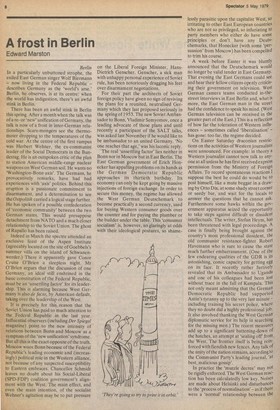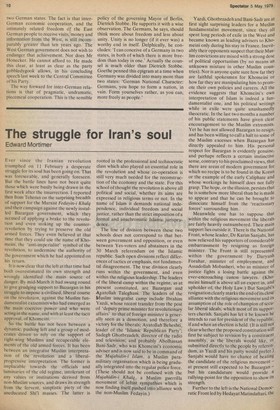A frost in Berlin
Edward Marston
Berlin In a particularly unbuttoned strophe, the exiled East German singer Wolf Biermann — now living in the Federal Republic — describes Germany as the 'world's arse.' Berlin, he observes, is at its centre: when the world has indigestion, there's an awful stink in Berlin.
There has been an awful stink in Berlin this spring. After a month when the talk was of a reor 'new' unification of Germany, the talk is now of a frost in inter-German relationships. Scare-mongers see the thermometer dropping to the temperatures of the cold war. At the centre of the first rumpus was Herbert Wehner, the ex-communist leader of the Social Democrats in the Bundestag. He is an outspoken critic of the plan to station American middle-range nuclear weapons on West German soil. He wants no 'Washington-Bonn axis'. The Germans, he provocatively remarks, have had bad experiences with 'axis' politics. Behind this eruption is a passionate commitment to disarmament, and a determination to see the Ostpolitik carried a logical stage further. He has spoken of a possible confederation of 'economic community' between the two German states. This would presuppose detachment from NATO and a much closer relationship to the Soviet Union. The ghost of Rapallo has been raised.
Indeed in March the spectre attended an exclusive feast of the Aspen Institute (agreeably located on the site of Goebbels's summer villa on the island of Schwanenwerder.) There it apparently gave Conor Cruise O'Brien a sleepless night. Mr O'Brien argues that the discussion of one Germany, an ideal still enshrined in the basic constitution of the Federal Republic, must be an 'unsettling factor' for its leadership. This is alarming because West Germany is also de facto, by American default, taking over the leadership of the West.
It is precisely for this reason that the Soviet Union has paid so much attention to the Federal Republic in the last year. Influential observers (including Der Spiegel magazine) point to the new intensity of relations between Bonn and Moscow as a symptom of the 'new unification' syndrome. But all this is the exact opposite of the truth. Moscow woos Bonn because of the Federal Republic's leading economic and (increasingly) political role in the Western alliance, not because of any suspected susceptibility to Eastern embraces. Chancellor Schmidt leaves no doubt about his Social-Liberal (SPD-FDP) coalition government's alignment with the West. The main effect, and even the main intention, of the socialist Wehner's agitation may be to put pressure
on the Liberal Foreign Minister, HansDietrich Genscher. Genscher, a sick man with unhappy personal experience of Soviet rule, has been notoriously dragging his feet over disarmament negotiations.
For their part the architects of Soviet foreign policy have given no sign of reviving the plans for a reunited, neutralised Germany which they last proposed seriously in the spring of 1953. The new Soviet Ambassador to Bonn, Vladimir Semyomov, once a leading advocate of those plans and until recently a participant of the SALT talks, was asked last November if he would like to be ambassador to an united Germany. `No one reaches that age,' was his laconic reply.
The real 'unsettling factor' lies neither in Bonn nor in Moscow but in East Berlin. The East German government of Erich Honecker has appalling problems on its hands as the German Democratic Republic approaches its thirtieth birthday. Its economy can only be kept going by massive injections of foreign exchange. In order to secure this money, the regime has allowed the West German Deutschemark to become practically a second currency, used for buying Western consumer goods over the counter and for paying the plumber or the builder under the table. This 'consumer socialism' is, however, so glaringly at odds with their ideological postures, so shame lessly parasitic upon the capitalist West, so irritating to other East European countries who are not so privileged, so infuriating to party members who either do have some principles or don't have any Deuts chemarks, that Honecker (with some 'persuasion' from Moscow) has been compelled to trim his course.
A week before Easter it was bluntly announced that the Deutschemark would no longer be valid tender in East Germany.
That evening the East Germans could see and hear their fellow citizens openly criticis
ing their government on television. West German camera teams conducted in-thestreet interviews in East Berlin and, what is more, the East German man in the street had the confidence to speak his mind. (West German television can be received in the greater part of the East.) This is a reflection of how far the toleration of Western influences — sometimes called 'liberalisation' — has gone: too far, the regime decided.
On Easter Saturday draconian restrictions on the activities of Western journalists
were announced. For example: in theory a
Western journalist cannot now talk to anyone at all unless he has first received express permission from the Ministry of Foreign Affairs. To record spontaneous reactions I suppose the best he could do would be to post himself, like a mute beggar in a drawing by Otto Dix, at some shady street corner or seedy bar, and wait for the locals to answer the questions that he cannot ask. Furthermore some hawks within the government apparatus seized the opportunity to take steps against difficult or dissident intellectuals. The writer, Stefan Heym, has been threatened with legal proceedings. A case is finally being brought against the country's most professional dissident, the old communist resistance-fighter Robert Havemann who is sure to cause the state much further embarrassment. (One of the few endearing qualities of the GDR is its astonishing, comic capacity for getting egg on its face. It recently rather furtively revealed that its Ambassador to Uganda and one of his colleagues had been lost without trace in the fall of Kampala. This not only meant admitting that the German Democratic Republic had supported Amin's tyranny up to the very last minute — including training his secret police, where they no doubt did a highly professional job. It also involved thanking the West German diplomatic service for its help in searching for the missing men.) The recent measures add up to a significant battening-down of the hatches, an attempt at 'sealing off from the West. The frontier itself is being reinforced with fiendish new fences. Any talk of the unity of the nation remains, according to the Communist Party's leading journal, 'at best, malicious gossip'. In practice the 'muzzle decree' may not be rigidly enforced. The West German reaction has been calculatedly low key. Noises are made about Helsinki and disturbances to the 'process of normalisation' — as if there were a 'normal' relationship between the You can't actually see fresh air. Or peace and quiet, or water purity. But a decent environment is an asset which everyone values: an invisible asset.
, And, like blank space in a newspaper, it comes at a price.
At Mobil's new refinery development Oil the Thames Estuary, that price will be around £12 million — the cost of equiPment to curb air, water and noise
Pollution.
Is even £12 million enough? There'd be Still less risk if we spent more. But as well as protecting the environment, companies have a responsibility to hold down the cost Of their products. And no amount of investment would completely abolish pollution — or eliminate the possibility of human error.
So where do we draw the line?
In practice, we don't. Environmental standards for industry are set by government authorities. Companies can either stick scrupulously to those basic standards or, as many do, they can go a little further, to improve conditions for their employees or to leave a safety margin — a little extra insurance.
But, as with any insurance policy, the degree of risk must be weighed against the cost of the premium.
Environmental standards are a delicate compromise between what technology can achieve and what society can afford; and that's a balance which can only be struck for society through its elected representatives.
Industry's responsibility is to demonstrate a real concern for the environment; to meet government standards without cutting corners; and to use its imagination and skill to meet them at the lowest possible cost to the consumer.
Mobil's £12 million may seem a lot to pay for an invisible asset. But it meets public standards generously, at the lowest cost we can manage.
And that's money well spent.
two German states. The fact is that interGerman economic cooperation, and the intimately related freedom of the East German people to receive visits: money and information from the West, is still incomparably greater than ten years ago. The West German government does not wish to endanger that achievement. Nor does Mr Honecker. He cannot afford to. He made this clear, at least as clear as the party gobbledygook allows, in his concluding speech last week to the Central Committee of his Party.
The way forward for inter-German relations is that of pragmatic, undramatic, piecemeal cooperation. This is the sensible policy of the governing Mayor of Berlin, Dietrich Stobbe. He supports it with a wise observation. The Germans, he says, should think more about freedom and less about unity. Unity is no longer (if it ever was) a worthy end in itself. Delphically, he concludes: 'I can conceive of a Germany in two states, in both of which there is more freedom than today in one.' Actually the counsel is much older than Dietrich Stobbe. Goethe penned this epigram at a time when Germany was divided into many more than two states: 'German National Character: Germans, you hope to form a nation, in vain. Form yourselves rather, as you can, more freely as people.'












































 Previous page
Previous page